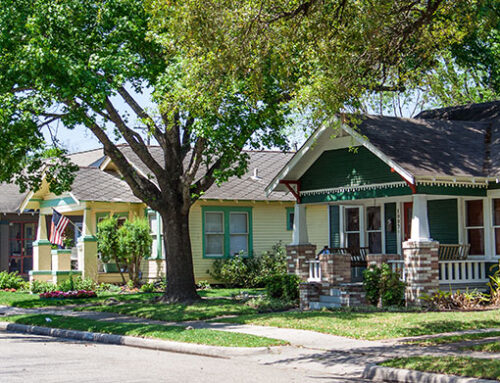
What is “Home Flipping” Really?
This guide, written with the help of the experts at HomeVestors®, the largest home buyer in the U.S., is meant to familiarize new potential investors with what some people refer to as the “home flipping” process, but HomeVestors® prefers to address the professional home buying business with its challenges, benefits, and ROI.
Flipping houses is a good business, but “home flipping” generally implies a quick buck for little work when the process involves a lot of hard work, knowledge, and skill. In fact, the professional real estate investor defines “flipping” as the process of buying a distressed house below market value, increasing its worth through repairs or other means, and selling it for a high price to make back the original investment and more. ”Flipping” can involve many complicated calculations, concepts, and decisions, and failing to understand these issues can cause you to lose money on your investment.
If you’re just starting a career in real estate investing, you probably have a lot of questions. But, the process doesn’t have to be overwhelming. We’ve laid out the following how-to guide to help you learn how to earn the highest possible return on your home-flipping investment.
Calculating Your Potential ROI for Home Flipping
Before you purchase a house, you must have the tools for valuing residential investment property to determine the potential return on your investment. If a house’s total cost is significantly less than its estimated after repair value, it can generate a return. To get the process going, you will need to address the following points.
Assessment
CONDUCT LOCAL MARKET RESEARCH
Research home prices in your area, and compare them with historical data to understand past trends. Understand which areas are gaining or losing value, and why. Study school districts, local governance districts, transportation options, and any other local factors that may influence home value in your area. Ask around in your network and research online.
FIND POTENTIAL HOMES
Search listings online and contact realtors in your area. Look for homes selling beneath the average value of others in their area, such as foreclosed homes. Identify and visit likely prospects.
INSPECT POTENTIAL HOMES
Hire a qualified, competent inspector to walk through the home with you. A thorough inspection should take 2-3 hours. Nationally, home inspections cost around $320 on average, and can range from $200 to $470 depending on the size of the home. You may be reluctant to pay this, but it’s an upfront cost that will offset the potential costs of unidentified problems with the home after you purchase or begin repairs.
ESTIMATE REPAIRS AND OTHER COSTS
- Based on the results of the inspection, determine what essential repairs are needed, such as issues with the foundation, structure, electrical, plumbing, or HVAC.
- Determine which nonessential or cosmetic repairs may improve the value of the home, such as new flooring, new paint, or new roofing. HomeVestors® eases this process with their proprietary ValueChek™ software.
- Determine if kitchen, bathroom, or laundry appliances could be upgraded.
- Get quotes from multiple contractors to compare repair estimates and options.
- While home inspections should identify any major issues with the house, a degree of uncertainty is always involved in the repair process, especially with each added layer of complexity. Electricians rewiring a bathroom may discover problems with the system that require more extensive rewiring, for example. To budget for the unexpected, add an additional 20% to the amount of all quotes.
- Calculate your other costs, such as realtors’ fees, transaction fees, loan payments, mortgage, utilities, taxes, and insurance and add them to your repair cost. Combine this figure with the purchase price to arrive at your total cost.
GO OR NO GO?
Figure out all your costs and compare them to your After Repair Value to determine if you can potentially get a return on your investment from the property. If your total costs are significantly less than your ARV, the investment will probably be sound.
ARV > Total Costs
ARV BREAKDOWN
AFTER REPAIR VALUE (ARV)
- The After Repair Value is the expected price a given home will sell for under current and expected market conditions.
- To estimate ARV, compare your property to other similar properties in the same area that have sold recently.
TOTAL COST
- Purchase Price
As the largest cost, purchase price presents the greatest chance to reduce your total expenditure through negotiation with the seller. - Repair/Renovation Costs
- Add 20% to estimates to account for unexpected costs
- Base repairs/renovations on the expected use of the home, depending on the surrounding area.
- Taxes
- Based on assessed property value.
- Can vary, depending on:
- Length of ownership;
- Personal or investment property; and
- Primary or non-primary residence.
- Carrying Costs
- Mortgage costs, utilities, insurance payments, and any home services.
- Multiplied by months carried. The average number of days a home stays on the market varies widely based on local factors, season, and asking price. Know how many months you will likely need to pay for and factor this into your costs.
- Interest/Cost of Money
Depends on funding source. A bank loan will generally cost more to borrow than a loan from a friend or acquaintance. Mortgage rates also vary based on the market, credit score, geographic area, debt-to-income ratio, and down payment. HomeVestors® offers funding support to all qualified purchases for its franchisees. - Transaction Fees
- Realtor fees, typically 5-6% of selling price.
- Escrow and recording costs: ~$1000, vary by market.
Example
By looking at other two-story, family use 3-bedroom homes near Dekalb and Stuyvesant in Brooklyn, I can determine this property will likely sell for $200,000 after repairs to the roof, new flooring, and a new coat of paint. This house is on the market for $140,000. Repairs are estimated at $35,000, and other costs are estimated at $17,000. This equals $192,000, or barely less than the ARV of $200,000. Don’t buy this house!
- After Repair Value = $200,000.
- Total Cost = Purchase Price + Repair Cost + Other Costs = $192,000.
- Total Cost is a significant percentage of After Repair Value. This house will probably not generate a return on an investment.
When You’re Ready to Buy
Once you’ve assessed that you’ve found a fixer-upper home for sale that may return your investment and then some, it’s time to make your purchase. Knowing the steps needed to close on a purchase and planning ahead can help ensure you’re able to seize the opportunity before the competition does.
Purchasing
SECURE FINANCING
- Secure the necessary funding from personal assets, a mortgage lender, or private sources.
- Mortgage lenders, either banks or private groups, will require financial information for approval and can generally take 30-45 days.
- Hard money loans are secured based on the value of the property, not solely on the credit history of the borrower, and are more accessible than funds from traditional lenders. While they carry higher interest rates than traditional loans, this is offset by a short repayment period.
- Private sources, such as friends or family, may not require information or as long a period of time. However, less funding may be available and rates may not be standard or fixed.
- Seek a fair interest rate and lock it in. Mortgage rates are variable based on the current market, as well as on credit score, geographic area, debt to income ratio, and down payment. Services such as Bankrate can provide up-to-date mortgage rate information.
NEGOTIATE WITH THE SELLER
- Submit an offer to the seller in writing. You should consult with a real estate lawyer prior to your first appointment to purchase a house, so that you have a good, state-enforceable contract. If you plan on consulting with an attorney, be sure to include legal fees in your total cost estimates.
- Expect a counteroffer, and be prepared to negotiate. Buyers decide how long a seller has to respond to an offer, which is typically 2-3 days. However, a negotiation may go back and forth between buyer and seller multiple times before everything is agreed upon.
CLOSE THE DEAL
- Open and fund escrow. Negotiate costs and fees with your escrow company.
- Review title and obtain title insurance.
- Remove contingencies written into your offer.
- Conduct a final walkthrough.
- Read and complete the paperwork.
CONGRATULATIONS!
You’ve taken the first step and the property is yours. Now the real work begins.
After You Buy
You’ve now undergone months of research, preparation, and hard work to find a house and rehabilitate it to market value. Now it’s time to make good on that effort, by preparing to sell the investment property and finding the right buyer.
Managing
OBTAIN PERMITS
Governmental permits will be required for any major work occurring on the house, and contractors cannot begin without the proper paperwork. Permits vary by jurisdiction, so make sure you do your research.
HIRE CONTRACTORS
Compare multiple offers, and check with references and your network to find a contractor who will provide quality work for a fair price. Be certain your contractor has valid insurance that will cover the duration of the project.
SCOUT BUYERS
Begin looking right away for potential buyers to sell your home to once repairs are complete. The less time it sits on the market, the lower your carrying costs and the sooner you can find another investment.
MANAGE REPAIRS/CONTRACTORS
Schedule the various contractors to avoid any potential conflicts, and deal with any issues as they arise. A general contractor will be more expensive, but will handle project planning and scheduling for you.
REMEMBER
As you manage repairs and the buying process fades into the past, don’t forget to keep the original equation in mind. As new costs spring up, or opportunities for more extensive renovations or improvements, remember to keep your total costs significantly below your expected ARV.
Before You Sell
You’ve now undergone months of research, preparation, and hard work to find a house and rehabilitate it to market value. Now it’s time to make good on that effort, by preparing to sell the investment property and finding the right buyer.
Selling
COMPLETE A FINAL INSPECTION
Perform another home inspection to assess the house after repairs and ensure it complies with municipal, state, and federal codes. Inspectors should be certified by a professional association, such as the National Association of Home Inspectors, and will provide a written report.
ASSESS VALUE
The repairs you have made will have changed the value of the home. Schedule an assessment with the government assessor for your tax district or a qualified professional to determine the property’s new value.
LIST HOME
List your home with a licensed realtor, post it yourself on MLS and Zillow, or sell it direct to a buyer you lined up while making repairs. Franchisees also find rental investors to purchase newly renovated homes.
ADVERTISE
- Advertise your house online, in local listings, and physically around the neighborhood.
- Hold open houses to attract interest.
- Reach out through your network to sell the house by word of mouth.
NEGOTIATE & FIELD COUNTER OFFERS
- Respond to buyer’s offers within the timeframe given.
- Negotiate price, fees, and other contractual points.
- You may choose to consult with a real estate attorney. If you plan on doing so, be sure to factor legal costs into your original equation.
CLOSE THE DEAL
- Signatures are obtained on the deed and other closing documents.
- Seller, lender, any lien holders, and service providers receive funds from escrow.
- Deed is transferred to county recorder.
- Closing documents are sent to buyer.
After You Sell
Pay capital gains tax
- Capital gains tax will be applied if the house is held for over a year. Otherwise the sale will be taxed as regular income.
- Rates will vary depending on whether it is your primary residence or not, how soon you sell it after you buy it, and whether the IRS considers it a personal or investment property. Consult with a tax expert to be certain of your situation.
While this is enough to get you started, there’s a lot more to know about buying and flipping homes. Each property comes with its own set of challenges, and a poor investment choice could take years to recover from. Experts recommend starting small and avoiding homes in need of major repairs. It will be to your benefit to start out by practicing on properties only requiring minor alterations, like new flooring or paint.
To learn more about the nuances of the process, take a look through our blog to learn more about what HomeVestors® can do for you. If you’re interested but don’t know how to take the first step, or have real estate experience but are having trouble finding leads, contact HomeVestors® to learn about our franchise programs, which include training and ongoing mentorship.
Contact
"*" indicates required fields





